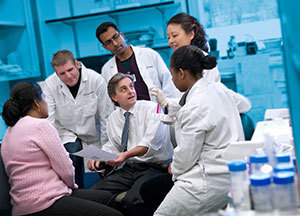
The University of Notre Dame and Feinstein Institute for Medical Research have announced a plan to collaborate on biomedical research projects, student training, joint conferences and other forms of academic exchange.
The Feinstein Institute was founded in 1999 to host the research operations for the North Shore-LIJ Health System. As a leading nonprofit research institute with more than 15,000 patients and volunteers participating in studies each year, this partnership will allow both organizations access to data sets, patient trials and groundbreaking innovations. Speaking about the agreement, Robert Bernhard, vice president for research at Notre Dame, said, “Being able to work closely with the world-class clinical researchers in their specialties at the Feinstein Institute will allow our analytical scientists and engineers to continue to be a powerful means for good in the world by solving problems of immediate interest to physicians and hospitals. We are grateful for the opportunity of this partnership and look forward to the fruitful results that this collaboration will bring.”
At Notre Dame, new discoveries in precision medicine are being made through a rapidly growing program in which scientists and engineers will collaborate directly with physicians, health systems and healthcare companies to find solutions to widespread high-mortality and high-cost diseases and conditions. Partnering with this program was of special interest to the Feinstein Institute, as “Each of our institutions brings with it a unique set of research skills and capabilities,” said Kevin J. Tracey, M.D., president of the Feinstein Institute. “By working together, we will be able to make real advances in treating a number of serious health challenges.”
Early targets of collaboration include sepsis, the leading cause of death from infection in the world and the costliest condition for U.S. hospitals, bioelectronic medicine, devices that stimulate nerves to treat disease, and the development of tools and methods for exosome biology, which has broad implications for diseases that affect the brain, like Alzheimer’s and Parkinson’s disease.
“Some of the main beneficiaries of this relationship will be Notre Dame students,” says Paul Bohn, Schmitt Professor of Chemical and Biomolecular Engineering, director of the Advanced Diagnostics & Therapeutics initiative, and a leader of the university’s Precision Medicine initiative. “Students working on these projects will have the chance to go to New York to work directly in the labs of collaborators at the Feinstein Institute. This kind of firsthand experience in a clinical setting will be tremendously valuable to them as they launch their careers,” Bohn said.
The University of Notre Dame and the Feinstein Institute are also partners in the Cleveland Clinic Healthcare Innovation Alliance, a national network through which healthcare organizations and scientists benefit patients by combining efforts in research, clinical investigation, and technology development and commercialization.
Contact: Joanne Fahey, Research Communications Program Director, Office of the Vice President for Research, 574-631-9762
Originally published by at news.nd.edu on September 08, 2014.